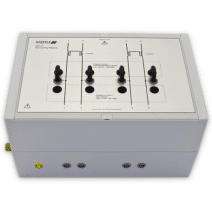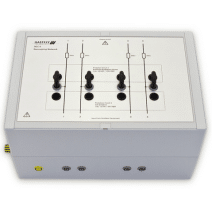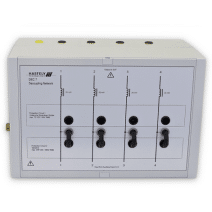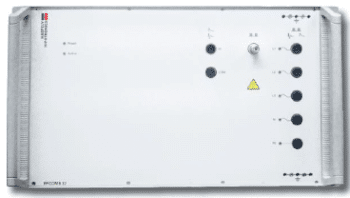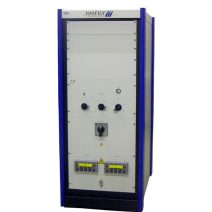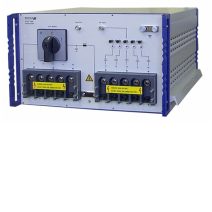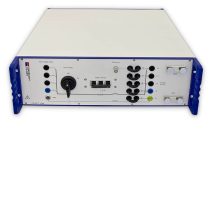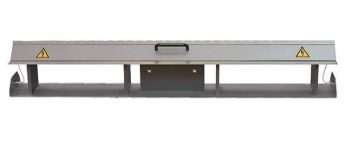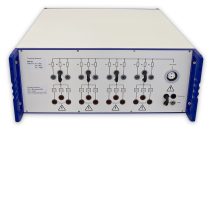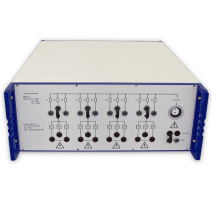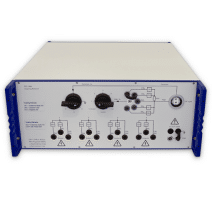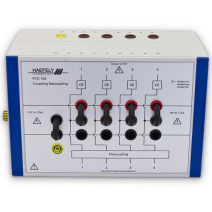Electromagnetic Compatibility (EMC) /
EMC Coupling Decoupling Networks
Coupling Decoupling Networks (CDNs) are devices that allow for the injection of disturbances on associated EUT/DUT cabling and subsequently removing it prior to auxiliary equipment. They serve the purpose of transferring energy or disturbances (coupling) and also removing energy or EMI/noise (decoupling). These are commonly used during EMC immunity testing as a method of injecting noise which the EUT/DUT will be exposed to, then subsequently removing unwanted interference. The design and capabilities of each network will differ depending upon the application, associated equipment, and underlying standard. The two main advantages of CDNs are: Low uncertainty of applied EMI/stress and Decoupling of the auxiliary equipment (AE). There are a variety of different applications where these type of devices are used, the two most common being conducted RF (continuous) and transient immunity tests. Both types of EMI tests are commonly conducted on a variety of different power and data (signal) lines requiring the use of CDNs during testing.
Coupling Decoupling Networks (CDNs) are devices that allow for the injection of disturbances on associated EUT/DUT cabling and subsequently removing it prior to auxiliary equipment. They serve the purpose of…
...transferring energy or disturbances (coupling) and also removing energy or EMI/noise (decoupling). These are commonly used during EMC immunity testing as a method of injecting noise which the EUT/DUT will be exposed to, then subsequently removing unwanted interference.
The design and capabilities of each network will differ depending upon the application, associated equipment, and underlying standard. The two main advantages of CDNs are: Low uncertainty of applied EMI/stress and Decoupling of the auxiliary equipment (AE).
There are a variety of different applications where these type of devices are used, the two most common being conducted RF (continuous) and transient immunity tests. Both types of EMI tests are commonly conducted on a variety of different power and data (signal) lines requiring the use of CDNs during testing.
-
The DEC 5 is used for decoupling auxiliary equipment from an EUT tested with either 1,2/50µs – 8/20µs combination wave impulses or 10/700µs...FIND OUT MORE
-
Product Overview The DEC 6 is used for decoupling auxiliary equipment from an EUT tested with 10/700us impulses up to 6.6kV peak. It is used to...FIND OUT MORE
-
The DEC 7 is used for decoupling auxiliary equipment from an EUT tested with either 1,2/50ms-8/20ms combination wave impulses or ring wave 100kHz...FIND OUT MORE
-
The FP-COMB 32 coupling/decoupling network – for Surge Combination Wave, Ring Wave and EFT/Burst – is fully compliant with the standard...FIND OUT MORE
-
IEC and EN standards cover testing of 3 phase AC and DC power ports. They include recommendations for the coupling and decoupling component values...FIND OUT MORE
-
The FP-EFT 100M2 is a manual three phase coupling / decoupling network (CDN) used for thee phase emc testing applications. The CDN can be used with...FIND OUT MORE
-
The FP-EFT 32M is a manual three phase coupling/decoupling network (CDN) used for thee phase emc testing applications. The CDN can be used with most...FIND OUT MORE
-
The IP4B capacitive coupling clamp is primarily used to inject fast transient and burst interference pulses into signal and data cables, i.e. into...FIND OUT MORE
-
The PCD 121 is used for coupling of 1,2/50us – 8/20us combination wave impulses up to 6.6kV peak onto unshielded symmetrical data and signal lines...FIND OUT MORE
-
The PCD 122 is used for coupling of 10/700µs impulses up to 6.6kV peak onto unshielded symmetrical data and signal lines according IEC/EN and ITU...FIND OUT MORE
-
The PCD 126A is used for surge coupling of 1,2/50us – 8/20us combination wave impulses onto unshielded asymmetrical data and signal lines according...FIND OUT MORE
-
The PCD 150 is used for surge coupling onto unshielded data- and signal lines according to IEC/EN standards. Damped oscillatory waves with both...FIND OUT MORE

